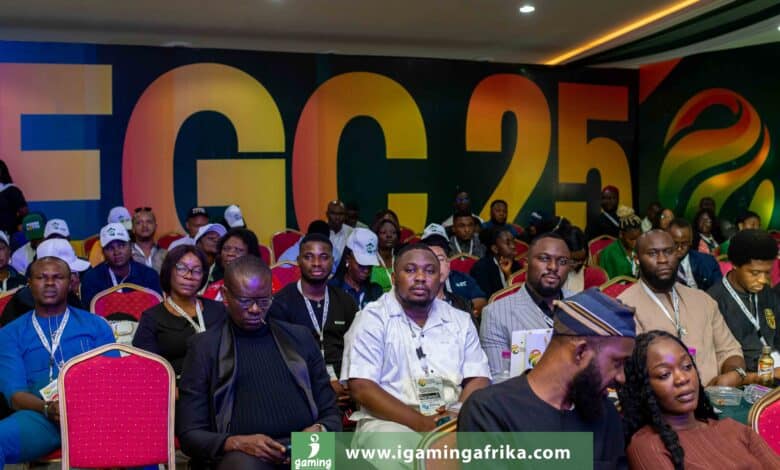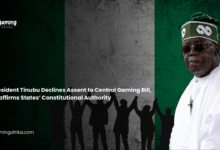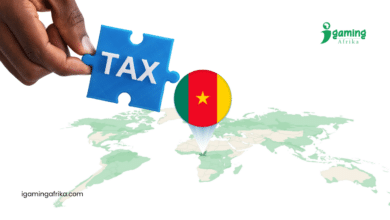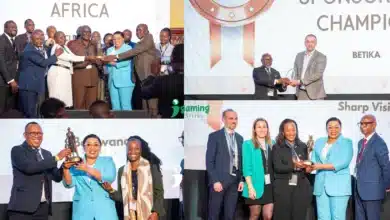Enugu Gaming Conference 2025: Reshaping Nigeria’s Gaming Landscape with Innovation and Integrity

The Enugu Gaming Conference for 2025 played the role of the great unifier when various stakeholders converged at the coal city for the second edition of its annual gaming conference on July 30 and 31, 2025. This year’s theme was timely and impeccable: ‘From unification to diversification: Shaping Nigeria’s Gaming Future.’ It comes at a time when the industry and the Federation of State Gaming Regulators of Nigeria (FSGRN) face a tussle brought on by the Centralized Online Gaming Bill.
The welcome address delivered by the Executive Secretary/ CEO of Enugu Gaming and Lotto Commission, Prince Arinze Arum gave every indication about the commission’s futuristic outlook on what compliance looks like at this critical juncture: “The conversations in gaming are no longer just about enforcement and revenue generation, it’s about innovation, cross-border collaboration, innovation and most importantly- structure.“
Arum made it clear that effective regulation is not up for debate if the Nigerian Gaming Industry is serious about enabling public trust, investment and innovation. He is keen on finding a middle ground whereby state level commissions can work in synergy with federal institutions and ensuring that responsible gaming remains at the center of gaming principles in the midst of market expansion.
In line with Arum’s line of thought, the Governor of Enugu State represented by the Honorable Commissioner for Finance- Honorable Nathaniel Uramah, acknowledged that the Enugu Gaming Sector has ‘proved to be a catalyst for investment’. He drew a connection between the Supreme Court Ruling and high expectations from the sector adding that ‘Enugu State Gaming and Lotto Commission is raising the bar for regulatory excellence.’
The Future of iGaming in Nigeria
The Enugu Gaming and Lotto Commission is being intentional about player protection by investing in technology which provides real-time data on licensing, registration and translates to the reduction of fraud. Through the employment of a Central Monitoring System (CMS), to achieve the aforementioned, the commission is certain that this gesture will translate to trust from its numerous stakeholders. The Commission is also set to introduce statewide mapping to boost monitoring and performance which would establish the premise for better gaming decision making and player protection.
Player protection is non-existent in any setting which does not guarantee data protection. During the breakout session which featured the CEO of National Data Protection Commission (NDPC)- Dr. Vincent Olatunji, represented by Barrister Alexander Owem- he stated that the future of gaming must be built on ‘privacy, security and compliance’. He also explained that the pursuit of decentralization by the gaming regulators need not lead to fragmentation. He made the following recommendations instead:
- Regulatory dialogue and alignment between state regulators and the NDPC
- Capacity building for operators on data protection that is sector- specific – The prioritization of user concerns and trust, based on the need for players to feel safe knowing that their data is protected.
Owem concluded by re-iterating that regulatory compliance enables investment and making it clear that ‘trust is the new currency in the digital age’
Digital Dashboards, Fair Dispute Systems & Public Trust
For medical doctor turned iGaming strategist, Dr. Kolade Abisoye, if the Nigeria iGaming industry is serious about boosting public trust and transparency, the regulators will need to invest in digital dashboards and fair dispute systems. Abisoye explains the advantages which digital dashboards come with including tracking activities, offering real-time reports and standardized resolution mechanisms.
Like Arum, Abisoye elaborated on the importance of responsible gaming being at the center of all that regulators and operators do. He focused on overlooked aspects like responsible advertising: ”The way a gambling advertisement is put together and targeted needs to be done responsibly so as not to target vulnerable groups or promise exaggerated winnings.”
He also called for accountability on the part of regulators in ensuring that self exclusion tools are embraced and strict payout timelines are enforced with consequences for non-compliance. Abisoye is not under the impression that this is a matter that can be handled by one stakeholder. He called for a stronger collaboration among the state regulators, licensed operators and Civil Society Organizations (CSOs):
Read Also: Caroline Kongwa Resigns Following Forensic Audit at the National Gambling Board
”I urge operators to localize customer support in languages they understand, teach players how to identify legitimate operators and communicate the risks that come with patronizing unlicensed platforms. For the CSOs, beyond criticizing the regulators or operators, you can help to educate people on the bright side of gaming, as opposed to amplifying the negative and you can also drive awareness campaigns.”
Responsible gaming: A fight against illegal operators
During the last panel session led by Head of Responsible Gaming at pawaTech – Olabimpe Akingba, the focus was on empowering the next generation by protecting public health through responsible gaming. Akingba called for a focus on the health narrative when addressing responsible gaming as opposed to a call for the ban of the industry, as this would be a gift to illegal operators: ”Don’t call for a ban of the i-gaming industry, instead let us continue to collaborate to fight against illegal operators.”
Akingba acknowledges that if conversations about responsible gaming began 4 years ago, much more progress would have been made to sanitize the gambling space. However, she gives credit to the regulators and operators who are at the forefront of this fight saying ‘better late than never.’ She gave special credit to operators who have gone beyond conversations about strenuous taxes that affect their profitability and have responsible gaming at the center of all that they do.
Conclusion
As the dust settles from Enugu’s coal city, one thing becomes crystal clear: Nigeria’s gaming industry stands at a crossroads where innovation meets regulation, and where trust becomes the ultimate jackpot. The conversations that echoed through the conference halls weren’t just about compliance checkboxes or revenue streams—they were about building an ecosystem where technology safeguards players, regulators collaborate rather than compete, and responsible gaming isn’t an afterthought but the foundation upon which an entire industry thrives.
From Prince Arum’s vision of structural unity to Dr. Abisoye’s call for digital transparency, and Akingba’s health-first approach to responsibility, the message is unanimous: Nigeria’s gaming future will be won not by those who roll the dice hardest, but by those who play the game most responsibly. The Enugu Gaming and Lotto Commission has clearly positioned itself as a pioneer in this transformation, setting benchmarks that could redefine gaming regulation across West Africa. But as Nigeria’s gaming industry prepares to deal its next hand, the question remains: Will other states follow Enugu’s lead in making player protection and regulatory excellence the ace up their sleeve?
Copyright 2025 Media-Tech iGaming Technology Limited. Permission to use quotations from this article is granted subject to appropriate credit being given to www.igamingafrika.com as the source.
Author: Cynthia Areh





















